|
|
Posted 10/3/2016 (link)
 Started in 2008, Writers Without Borders "features writers from around the world whose fiction, drama, poetry, memoir, journalism, and performance art demand an international — and, what's more, a globally minded — readership and response. Through this ongoing series, Penn's provost has challenged the students and faculty who form the literary community at the Kelly Writers House to bring to the intimate cottage at 3805 Locust writers whose voices — whether because of regional unrest, cultural turmoil, aesthetic misunderstanding, the difficulty of travel, problems of translation, etc. — have not been much heard here."
The latest event in the series, which took place on September 8th of this year, featured Nicole Peyrafitte and Pierre Joris in a joint multimedia-augmented performance exploring the concept of "domopoetics," arising out of the authors' long marriage and shared creative practices. You have to see it to believe it, and you can do so here.
Previous events in the series available on PennSound's Writers Without Borders series page include readings by Lucas de Lima and Hiromi Itō, Matvei Yankelevich and Eugene Ostashevsky, Arkadii Dragomoshchenko, Anna Hallberg, Jörgen Gassilewski, Mark Weiss, Tianna Kennedy and Tomomi Adachi, Christian Bök, Dmitry Golynko, Régis Bonvicino, Wystan Curnow, Zhimin Li, Breyten Breytenbach, New European Poets (Adam Sorkin, Marella Morris-Feltrin, Murat Nemet-Nejat, and J.C. Todd), and Cecilia Vicuña.
Posted 10/5/2016 (link)
 Today we're highlighting a trio of recently-added episodes from Between the Covers — David Naimon's wide-ranging literary radio series broadcast on Portland, Oregon's KBOO 90.7 FM. These three shows first aired in April and May of this year.
First, there's Naimon's conversation with Brian Blanchfield, author of Proxies, a book of essays hailed by Maggie Nelson as "a momentous work informed by a lifetime of thinking, reading, loving, and reckoning, utterly matchless in its erudition, its precision, its range, its daring, and its grace." That's followed by a program on Ways to Disappear, the debut novel by poet and translator Idra Novey, which NPR has called "a fast-paced, beguilingly playful, noirish literary mystery." Finally Naimon sits down with Ursula K. LeGuin to discuss her newest poetry collection, Late in the Day — a book that, in his estimation, "seeks meaning in an ever-connected world, giving voice to objects that may not speak a human language but communicate with us nevertheless through and about the seasonal rhythms of the earth, the minute and the vast, the ordinary and the mythological."
You can listen to these programs, along with previous episodes featuring Nelson, Claudia Rankine, Sarah Manguso, Mary Ruefle, and David Biespiel on our Between the Covers series page.
Posted 10/6/2016 (link)
 We were very excited to see PennSound author Peter Gizzi in very talented company on the today's National Book Award poetry shortlist for his latest Archeophonics (Wesleyan University Press, 2016).
The NBA citation observes that "Archeophonics, defined as the archeology of lost sound, is one way of understanding the role and the task of poetry: to recover the buried sounds and shapes of languages in the tradition of the art, and the multitude of private connections that lie undisclosed in one's emotional memory." They continue: "The book takes seriously the opening epigraph by the late great James Schuyler: 'poetry, like music, is not just song.' It recognizes that the poem is not a decorative art object but a means of organizing the world, in the words of anthropologist Clifford Geertz, 'into transient examples of shaped behavior.' Archeophonics is a series of discrete poems that are linked by repeated phrases and words, and its themes and nothing less than joy, outrage, loss, transhistorical thought, and day-to-day life. It is a private book of public and civic concerns."
You can hear Gizzi reading from Archeophonics in the second half of his April 14, 2015 reading as part of Dia's Readings in Contemporary Poetry series. You'll find that video and a wide array of other recordings going back as far as 1992 on his PennSound author page.
Posted 10/10/2016 (link)
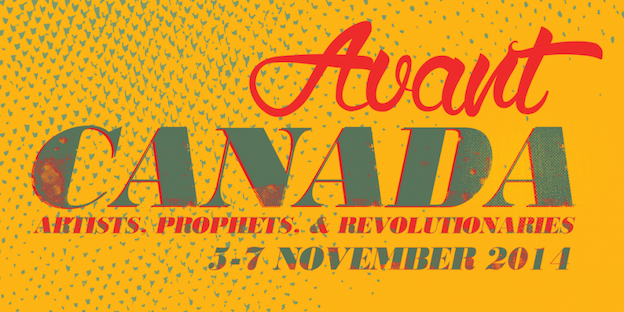 Today is Thanksgiving Day for our neighbors in Canada, and one thing we're certainly grateful for is "Avant-Canada: on the Canadian Avant-Garde," a new feature edited by Gregory Betts and Katie L. Price, and published late last week.
With roots in the "Avant Canada: Artists, Prophets, Revolutionaries" conference, held at Brock University in St. Catharines, Ontario, on November 4–6, 2014, this feature consists of responses from authors and other cultural figures not at the conference to video footage of a dozen of its many presentations. As the editors observe, "A major focus of the event was Indigenous poetics and politics, including the keynote address by Stó:lõ First Nations elder, philosopher, and author Lee Maracle. Her apposite message to the future-oriented, mostly settler audience was to remember: remember how and why your families came to Canada, remember who was here to greet them, remember the violence of displacement and the violence of the passage across the Atlantic. The turn to the past contradicts typical understandings of the avant-garde, which as Tyrus Miller has noted, is 'constituted and defined by anti-historical impulses.' To stand before a group of avant-gardists and point back in time was risky, but the fact is that Maracle's message played into already mobilized undercurrents in the contemporary Canadian avant-garde that are moving poetic practice forward in new and necessary directions."
You can read more about the feature and browse its table of contents — including pieces by Stephen Collis, Sarah Dowling, Rachel Blau DuPlessis, Lori Emerson, Alexis Pauline Gumbs, Kaie Kellough, Tyrus Miller, Heather Milne, Erin Mouré, Vanessa Place, and Alex Porco — here.
Posted 10/11/2016 (link)
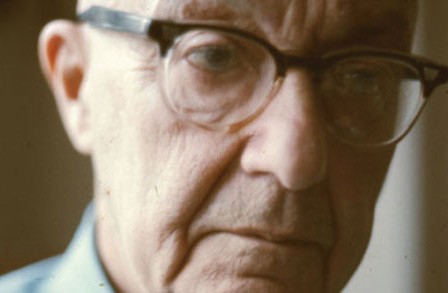 On March 27, 1975 Charles Reznikoff was a guest on Susan Howe's WBAI/Pacifica radio program — the first of three sessions he'd record over the course of six months that year. After Howe's biographical introduction, Reznikoff begins his set with "Samuel" from "A Fifth Group of Verse." Next he asks his host, "may I read a group of verse about two or three holidays, which, though Jewish, are often mentioned in current newspapers?" He then reads from "Meditations on the Fall and Winter Holidays," starting with "Hanukkah," then "New Year's," before coming to the poem that, appropriately enough, we are highlighting this evening, "Day of Atonement" (listen here: MP3).
"Yom Kippur has always been rich terrain for Jewish writers," an unattributed 2002 article in The Washington Post observes, "but secular modern and contemporary American Jewish poets have given the subject a particular metaphorical resonance. They seize upon the holiday as an opportunity to meditate about forgiveness and unrepentance, or about the rival claims of solitude and community, or about the nature of suffering and affliction." Reznikoff's "Day of Atonement" is hailed as one of the author's "own short list of good contemporary Yom Kippur poems" alongside work by Adrienne Rich, Robert Mezey, Robin Becker, and Jacqueline Osherow.
Yom Kippur had greater significance for the poet, however, than its religious symbolism. Reznikoff's Poetry Foundation bio (written by Milton Hindus) recalls a history of "violent and traumatic incidents" that marked his upbringing in Brooklyn, including one incident that "took place at the conclusion of the evening prayers on the Day of Atonement, when his grandfather and his uncle were unexpectedly late in returning from the synagogue in Brownsville to which they had walked." An anxious Charles went looking for them, only to find "his grandfather coming down the street alone, tears streaming down his face, unable to answer 'where's uncle?' And his uncle appeared 'without his new hat and the blood running down his face.'" Hindus fills in the details: "As they were passing a bar a little boy, encouraged by a gang of young ruffians, had brandished a stick at them. The uncle had taken the stick away, and some of the gang jumped the old man and sent him sprawling in the gutter."
"There can be no doubt," he concludes, "that his direct and indirect observation of violence (and his sense of its perpetual immediacy) as a Jewish child in a hostile urban neighborhood lies behind the lifelong concern in much of his work with the continual possibility, potential, and actuality of violence between human beings." And yet, in the face of this threat, Reznikoff is able to find grace in "Day of Atonement": "All wickedness shall go in smoke. / It must, it must!," he vows. "The just shall see and be glad. / The sentence is sweet and sustaining; / for we, I suppose, are the just; / and we, the remaining." Let us hope that that might be true.
Posted 10/13/2016 (link)
 We're very sad to pass along the news of David Antin's death after a long struggle with Parkinson's disease. The iconic talk poet and critic was eighty-four years old.
Judging from the responses we're seeing on social media, Antin will be dearly missed, and certainly we share that sense of loss. PennSound co-director Charles Bernstein called him "A great inspiration, radical model, dearest friend, and ever an iconoclast," and in my own note, I recognized that Antin "represented poetry at its most commodious and yet the rambling potential of his language was filtered through a singular mind. What he made look easy would be impossible for most of us."
Luckily, we're able to share nearly forty years' worth of recordings with our listeners through our David Antin author page, and it's often the case that these talks are the original raw material from which his printed talk poetry pieces were drawn. Thanks to the quick action of A. L. Nielsen, we've just added a new recording to the page that first aired on his Incognito Lounge radio program: a 1994 symposium on the surrealists organized by Sun and Moon publisher Douglas Messerli, which also included Antin, Jerome Rothenberg, and Will Alexander. You can listen to it here.
Posted 10/17/2016 (link)
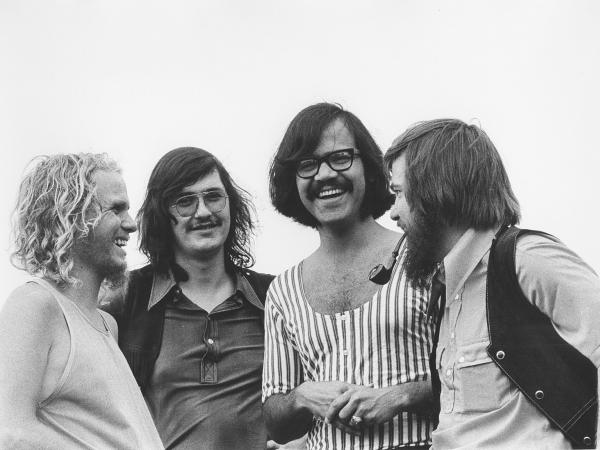 Our latest author page is for Rafael Barreto-Rivera. There, you'll find his 1984 cassette, Scrabble Babble, released as part of the New Fire Tapes series from Membrane Press.
There are five tracks altogether. "Scrabble Babble" parts 1–3, are rooted (like a number of latter-day Bernadette Mayer poems) in lexicons generated by a game of Scrabble, but then veer off into extended phonemic vocal performances, with the third in the set aided by the presence of a self-oscillating (and at times modulating) delay. Barreto-Rivera's conscious interplay with the echo here is particularly fascinating and it's a shame that this is the shortest of the titular pieces.
The remaining two tracks take more rarified approaches to the techniques used in the "Scrabble Babble" sequence: "Air Blind" is a long, wordless piece that plays many varieties of human breathing against growls, drones, and guttural rumblings, while "Here It Has Rained (fragment)" features speech alone without manipulations of any sort.
Barreto-Rivera was, of course, also a member of the Four Horsemen — in the group photo above he's wearing a striped t-shirt — and we've also provided links to our Four Horsemen page, where you can immerse yourself in their always-exciting experiments with sound and performance, both live and in the studio.
Posted 10/19/2016 (link)
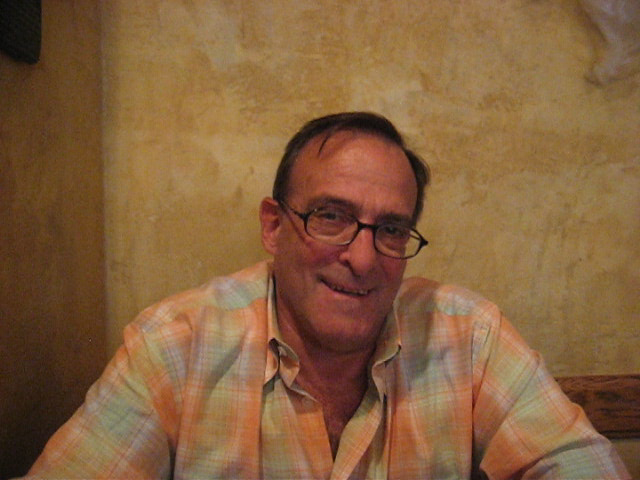 We recently posted audio from the St. Mark's Poetry Project's tribute to Ted Greenwald, who passed away this past June.
Recorded on September 16th, this marathon event — running more than two hours in length — included contributions by
Alan Bernheimer, Charles Bernstein , Miles Champion, Alan Davies, Ryan Eckes, Ed Friedman, John Godfrey, Erica Hunt, Michael Lally, Ron Padgett, Arlo Quint, Kit Robinson, Kyle Schlesinger, Patricia Spears Jones, Stacy Szymaszek, Chris Tysh, Lewis Warsh, Barrett Watten, and Terence Winch. You can read more about the event here.
Don't forget about our Ted Greenwald author page, which is home to recordings from the early 1970s to the present, including readings, radio appearances, video from Public Access Poetry, and a two-part Close Listening program with Bernstein from 2005. You can read Bernstein's tribute to Greenwald here.
Posted 10/20/2016 (link)
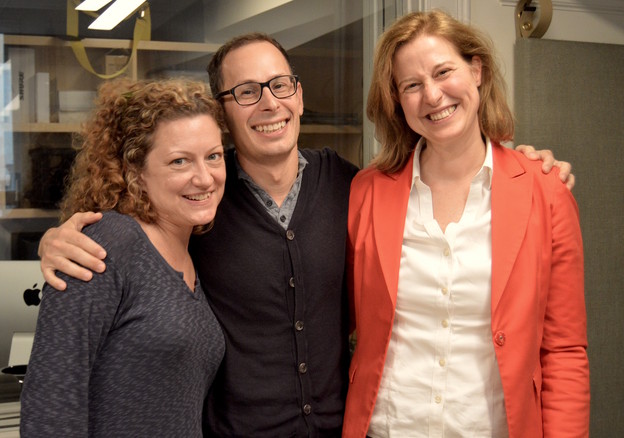 Yesterday we released the latest episode (#105) in the PoemTalk Podcast series, which is focused on Michael Magee's poem "Morning Constitutional." For this show, host (and Kelly Writers House Faculty Director) Al Filreis is joined by a trio of panelists with deep ties to the house: Kristen Gallagher, Kerry Sherin Wright, and Joshua Schuster.
As Filreis explains in his introduction on the PoemTalk blog Magee was there at the start of KWH as well, more than twenty years ago: "This was Magee in his pre-Flarf days, the late 1990s. He was finishing a doctoral dissertation on Emerson, pragmatism, Ellison, and jazz; was beginning a relationship with the person, now his partner, who had created the Kensington Needle Exchange; was inventing the experimental little magazine Combo (under the auspices of the Writers House); and was taking long, daily morning Emersonian/Whitmanian constitutionals, walking the city incessantly described as the cradle of constitutional democracy. The book of poems resulting from these experiences, Morning Constitutional, was published in 1999 (by Kristen Gallagher's Handwritten Press), and then again in 2001." You can read more on Jacket2.
PoemTalk is a co-production of PennSound, the Kelly Writers House, Jacket2 and the Poetry Foundation. If you're interested in more information on the series or want to hear our archives of previous episodes, please visit the PoemTalk blog, and don't forget that you can subscribe to the series through the iTunes music store.
Posted 10/24/2016 (link)
 We're getting this new week off to a good start with two new Close Listening programs from PennSound co-director Charles Bernstein. Today, we're highlighting his recently-added program with Lisa Robertson, the Toronto-born author of XEclogue, Debbie: An Epic, The Men, R's Boat, Cinema of the Present, and her latest, 3 Summers.
Bernstein describes the new program as follows: "Lisa Robertson talks with me about her new book; the form of Cinema of the Present; rethinking lyric and epic poetry through feminism; experimentation and/or subjectivity; prose versus verse; the persistence of beauty, pleasure, and the aesthetic; early connections to the Kootenay School of Writing; living bilingually in France and the bubble of monolingualism; soft architecture; writing essays for visual arts publications; and seeing the world through rose-colored glasses."
You can listen in here. Other programs in the Close Listening series can be found here, and be sure not to miss out on Robertson's PennSound author page, where you'll find readings, talks, and interviews going back more than twenty years.
Posted 10/26/2016 (link)
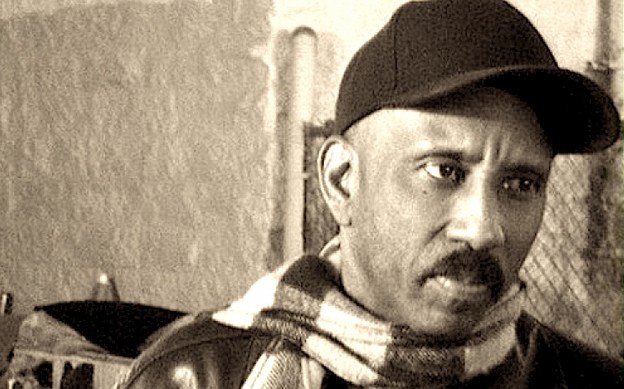 Today we continue highlight new Close Listening programs from PennSound co-director Charles Bernstein. with a recently-added program from LA-based poet Lisa Robertson. Starting with 1987's Vertical Rainbow Climber, he's published numerous books in multiple genres including Asia and Haiti (1995), Sunrise In Armageddon (2006), The Sri Lankan Loxodrome (2010), Singing in Magnetic Hoofbeat: Essays, Prose Texts, Interviews and a Lecture 1991-2007 (2012), Towards the Primeval Lightning Field (2014), and Based on the Bush of Ghosts (2015).
Here's how Bernstein describes the new program: "Will Alexander talks with me about his early immersion in the work of John Coltrane and its abiding connection to his own jazz-process / Surrealist poetry, discusses his 'constellation" of mythological and scientific sources, the influence of Aimé Césaire on his work, the politics of his poetic form via resistance to colonization, the role of the black poet in America, the necessity of performance, and his aim bring the reader into a state of 'supra-mind.'"
You can listen to this half-hour program here. Other Close Listening episodes can be found here, and on Alexander's PennSound author page, you'll find a wide array of recordings beginning with the 1994 Surrealism Symposium we announced a little earlier this month and going all the way up to this past March.
Posted 10/27/2016 (link)
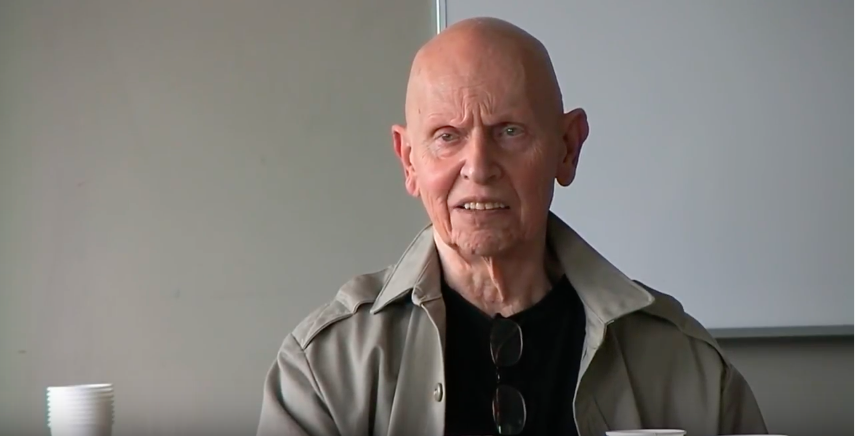 Thanks to the kindness of George Quasha, we're able to share this half-hour video of David Antin discussing the life and work of Kathy Acker — "a dazzlingly charming and funny and brilliantly powerful writer, whose work I've always felt very close to," he notes — as part of a Acker symposium at New York University on November 8, 2002. It's a rare opportunity to witness one uncompromising artist offering their assessment of another equally uncompromising artist.
"Let me point out I knew Kathy before she was the Kathy Acker you all know," Antin begins, discussing his first meeting her at UC San Diego in 1968, when she was working as a teaching assistant and associating with other "refugees from Brandeis," along with her husband Robert (nominally a student of Marcuse). He goes on to discuss "the climate in which Kathy came to be a poet" — specifically "the proclaimed sexual revolution" and "the year of the assassinations" (Antin's arrival in the city coincided with Robert Kennedy's murder and Valerie Solanas' shooting of Andy Warhol) — then recalls the guidance that he provided to young and aspiring writers like Acker, Mel Freilicher, and others from their social circle, the conceptual art projects he worked closely with (including a Fluxus retrospective), and associations with figures like his wife, Eleanor, Jerry and Diane Rothenberg, Lenny Neufeld, George Quasha, et al., all of which proved to be very influential. "She was exposed to all of these people in various ways that were useful to her," he observes.
He goes on to talk about her compositional use of constraint ("Her engagement was with so many things but she had to restrain herself to not be all over the place all at once."), her means of getting her work out to wider audiences, and the qualities that made her a singular talent: "Kathy had both intelligence and energy, and she had desire [...] It was the intensity of her desire for life." It's a gossipy, raucous recollection that also reveals deeper truths about how Acker came into her own. You can watch it here.
Posted 10/31/2016 (link)
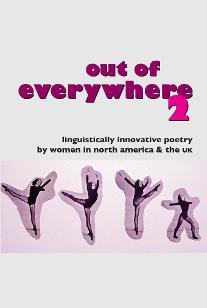 More than two decades after the first volume in the Out of Everywhere series of "linguistically innovative poetry by women in North America & the UK" was published by Reality Street, the venerable publisher is back with Out of Everywhere 2. Edited and with an introduction by Emily Critchley, this new edition includes contributions from forty-four contributors and there's also a limited-edition CD available with performances from nine of the authors in the book.
The recordings we're highlighting today aren't from that disc, but rather an event organized by Xing the Line at the Contemporary Poetics Research Centre - Birkbeck, University of London on August 6th of this year, and recorded by Colin Still (of Optic Nerve and Rockdrill fame). There are short sets (between ten and twenty minutes) from six of the poets featured in the anthology: Jennifer Cooke, Emily Critchley, Frances Presley & Elizabeth James, Sophie Robinson, and Carol Watts.
You can listen to the complete event, which is broken into individual sets for each performer, by clicking the title above. A complete list of poets included in the new anthology can be found here, and you'll find recordings by many of them by browsing PennSound's authors directory.
|
PennSound Daily archive
2025
2024
2023
2022
2021
2020
2019
2018
2017
2016
2015
2014
2013
2012
2011
2010
2009
2008
2007
|













